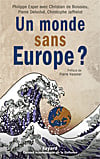 Currently reading about the question of European security for my dissertation, I came across a very insightful book – in French – entitled Un Monde sans Europe? (A world without Europe?). The manuscript’s research question is very simple: what are the challenges, and possible opportunities, for France and Europe in this transforming world?
Currently reading about the question of European security for my dissertation, I came across a very insightful book – in French – entitled Un Monde sans Europe? (A world without Europe?). The manuscript’s research question is very simple: what are the challenges, and possible opportunities, for France and Europe in this transforming world?
In order to answer such a broad question, the authors identified the most urging threats to the security and stability of the current world order, Europe, and ultimately France. The threats selected fit within the model developed by the Copenhagen School in its very famous 1997 book, Security: A New Framework for Analysis. As argued, threats fall under five categories: military, political, societal, environmental and economical. A World without Europe touches on these questions of military and security threats such as terrorism and proliferation; but also addresses economical and environmental threats, such as energy security, food and water scarcity, and the rise of Asia.
The argument can be summarized by the following illustration:
The economic-military approach finds its rationale in the fact that according to the authors, “a country cannot pretend to power or even at self-defense without possessing a sovereign industry.” National production of means of security and defense are central for maintaining autonomy of the political and military decisions. The argument is that power is intertwined with economic dominance. Without a strong defense industry, military power cannot be attained. Thus, one of the problems of the EU is its low investments compared to the US on defense budget, and R&D spending. One of the questions that I have been asking around is: can the EU become a global security actor without a common defense market? The answers have been extremely divided as one can imagine. One thing is certain, the European Defense Agency was created for this purpose.
Concerning military questions, the authors argue that in the collective consciousness of Europeans, a large military action cannot be undertaken without the US. Peace operations can be launched by the EU, but war operations can only take place under NATO’s umbrella. This claim can be validated by the examples of CSDP deployments as part of crisis-managements and the military attack on Libya using NATO forces.
The conclusion of the book is a direct call to the European political elites to create a debate at the European level addressing the question of European defense and security policy. Such a project should be done in order to sensitize public opinion. Such a conclusion is not surprising coming from a study group in part financed by the French Ministry of Defense. However, this call to public awareness on the issue of European defense can only have positive results. Since 1998, the ESDP and now the CSDP have grown under the radar of the general public awareness. The two following tables taken from the Transatlantic Trends, published by the German Marshall Fund, clearly underline the perceptions of the EU as a global actor by European constituents.
The EU is perceived as an agent of soft power and contributing to development/reconstruction efforts rather than being a military actor. Its civilian nature is closely connected with European citizen’s psyches; and the gap between Member States’ interests and citizens perceptions and desires has considerably increased. Such debate could directly address the question of the EU as a global actor. For too long the questions of security and defense have fallen under the responsibility of the state without including citizens. Time should come for real open thematic debates on the European Parliament floor, which hasn’t been done since the Treaty of Lisbon, but this time with direct feedback onto public fora.